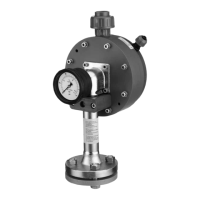English (GB)
15
5.2 Checks before commissioning
Check tightness of the total plant before start-up.
– Observe manual of the gas dosing regulators!
5.2.1 Checking the tightness of pressure gas lines
Pressure gas lines are all lines from the gas containers to the
vacuum regulator.
• If the plant is equipped with a nitrogen rinsing device: Check
tightness roughly with nitrogen
• Detailed checking: with ammonia
5.2.2 Checking the tightness with nitrogen
• Close all container valves
• Open container connection valves and all shut-off valves up to
the gas dosing system
• Open the connection valve of the nitrogen cylinder
• Slowly open the valve of the nitrogen cylinder, until the lines
have a pressure of about 10 bar (read at the manometer of the
vacuum regulator).
• Apply leakage spray or soap water to all components under
pressure
– Formation of bubbles and/or pressure drop at manometer
-->Leakage in pressure lines!
• Depressurize the plant!
• Eliminate leakage!
• Check tightness again!
– No formation of bubbles, pressure at manometer does not
drop significantly within one hour
--> Pressure lines are tight.
5.2.3 Checking the tightness with ammonia
• Open all container valves and container connection valves and
quickly close them again
• Slowly pass the open ammonia bottle along pressure-gas
leading parts
– Formation of white mist: Leakage in pressure lines!
• Depressurize the plant!
• Eliminate leakage!
• Check tightness again!
Fig. 19 Formation of white mist: Leakage in pressure lines!
– No formation of white mist: Pressure lines are tight.
Fig. 20 Pressure lines are tight
Fig. 21 Liquid ammonia makes leakages by corrosion
6. Operation
6.1 Function
• Reducing the gas pressure (overpressure) to subatmospheric
pressure (vacuum)
• In case of too high pressure in the device (e. g. if the inlet
valve is soiled or damaged) the overpressure valve opens.
– Gas will be lead to the absorption vessel.
• In case of the gas container getting empty or blocked gas
supply (too high vacuum in the device) the vacuum regulator
closes.
– Gas containers will not be evacuated with the injector
vacuum.
6.2 Display Elements
• Manometer
– displays the gas pressure at the inlet (admission pressure)
6.3 Operating
– Observe manuals of the other components.
Warning
Check the tightness not until the total plant is ready
for start-up.
Danger of gas leakage!
Warning
Before checking the tightness:
Start running the optional built-in liquid trap or the
seperate liquid trap!
Danger of gas leakage!
Warning
Maximum nitrogen pressure 16 bar!
Danger of damages and gas leakage when being
exceeded!
TM04 0849 0908
TM04 0697 0908
Warning
Liquid ammonia must not come in contact with parts
of the plant!
Danger of leakages by corrosion!
TM04 0698 0908
Warning
Do not exceed the max. admission pressure!
Danger of gas break-out!
The device is passive. All adjustment has to be made
at other parts of gas dosing plant!

